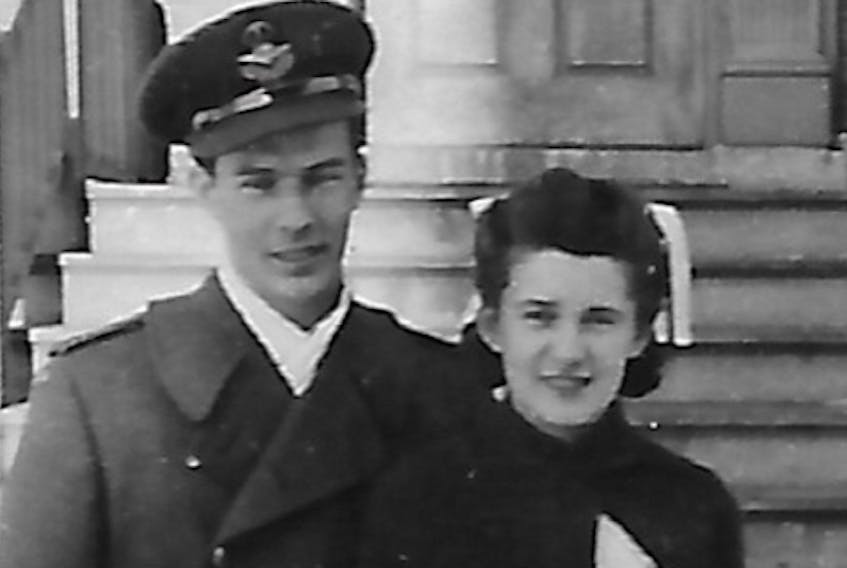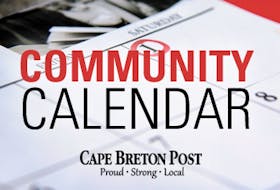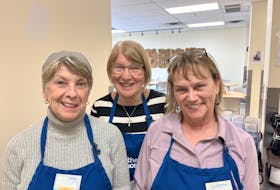Pleasant Street was the home of the Harding family. Harold was the oldest boy and an accomplished violinist. Every day, music could be heard from within the room where he practised.
He would perform compositions like “Flight of the Bumble Bee,” while tapping his foot on the floor or keeping tune to Cape Breton fiddle music. He would also accompany his sister Mimi, an organist and pianist, for an entertaining hour of music like "Shubert’s Serenade" or hymns.

The year was 1944 and the townspeople wanted to hasten the war’s end, so in many towns there were “salvage depots” which collected used aluminum, pots and pans. We understood that this aluminum would be melted down and used to build ships and planes.
My father donated his binoculars for a soldier in the field. He was told they would be returned at the end of the war, but, of course, they were never seen again.
On Saturday morning, April 14, 1945, the Second World War had nearly ended. A telegram arrived from the War Department telling my parents, Mr. and Mrs. Fred Harding, that their son, Flying Officer Harold Harvie Harding, was “missing in action.”
Telegrams were delivered back then by a boy on a bike. Neighbours who saw the telegram arrive came by to hear word and offered to pray for happier news. We had no television in those days so when we heard the news we would hurry into the dining room to our only radio where the voice of the CBC's Matthew Halton would read the news.
My mother was inconsolable as she feared the worst had occurred. Many men in our town had been killed in this terrible war. There was a family one street away that had 11 children — four were boys and every one of those boys was killed in the war. On Remembrance Day years later, their mother, Mrs. Meech, was the Silver Cross Mother during national commemorations in Ottawa.
My sister Mimi suggested that this Saturday be spent as a regular Saturday so she started making cookies, and I helped. My father looked worried but he reminded us that Harold had always returned from deer hunting and fishing and he was sure that Harold was alive.
My mother volunteered in the war effort in her own way. She went door-to-door selling war bonds. She would come home with hundreds of dollars in her briefcase, but there was no worry that she would ever be robbed. This was the 1940s after all.
After the war, the bank asked her to sell Canada Savings Bonds but this time she would receive commission, and she accepted.
She was quite exceptional, being the first female automobile driver in her town of North Sydney. Driving a car with a standard transmission at that.
On Sunday of this tense weekend, my mother took us to her Baptist Church and in the afternoon the minister drove us to Glace Bay where my sister Ruth had been in nursing school. She was a registered nurse now and we soon spotted her in town.
She was upset to hear the news of Harold and came with us for the remainder of the weekend. We spent time looking through albums and talking about Harold and his jokes.
He was 20 when he enlisted in the Royal Canadian Air Force in Halifax. Later, in England, he was assigned to the Royal Air Force as a navigation officer on board a Lancaster bomber.
My mother kept stacks of letters that Harold wrote on blue airmail paper, both sides, and when folded there was a blank space for an address and that is where it would be stamped censored. When unfolded, it would reveal cut out sections that would leave us guessing what was said.
BIO
Harold Harvie Harding
- Born: Oct. 20, 1923 in North Sydney
- Died: July 21, 1970 in Sydney
- Early employment: Bank clerk
- Enlisted: January 1943 in Halifax
- Rank: Promoted to sergeant from leading aircraftman in January 1944. Served as flying officer in 1945.
- Mission: On April 10, 1945, Harding was the navigator of a crew detailed to attack Plauen, Germany. He ejected from his aircraft, which went down under heavy anti-aircraft fire, landing safely in Belgium.
- Award: Received the Distinguished Flying Cross for his bravery on the April 1945 mission over Plauen.
At 1:30 a.m. Monday our phone rang and at that hour we just knew that it had to be good news. Everyone sat on the steps going down to the foyer where our only phone was affixed to the wall.
My mother made her way to the phone and she picked up the ear receiver to say, “hello,” into the speaker on the wall. We heard her say, “Would you please repeat that?” She began shouting happily, “Harold is safe!”
He had returned to the base with everyone in his squadron alive.
We later learned that Harold as navigation officer had been on a bombing mission over Plauen, Germany, when an oil leak occurred. His colleague, Capt. Joseph F. Mooney, flew on to complete the mission.
While returning to base another leak plus anti-aircraft fire had disabled two of four Rolls-Royce engines in the plane.
As soon as they were over Belgium Capt. Mooney ordered everyone to bail out. They did so with Mooney bailing at 500 feet above the ground. He was recommended for the Distinguished Flying Cross for his act of valour and courage.
And it was said that First Officer Harding, by navigating his badly damaged bomber to the target and back to friendly territory, used his quiet confidence and was largely responsible for his crew returning safely to friendly territory.

When Harold passed by the remains of his plane, he noticed his officer’s cap had blown out of the aircraft and was lying on the ground. It had cinder burn holes and dust on it. He brushed it off and put it on his head. He was still wearing his navigator’s watch even though all identifying material should be thrown into the plane’s wreckage.
When Harold rejoined his comrades, he told me that one of them remarked: “Isn’t that like Harding to meet us wearing his cap.”
They had landed in a farmer’s field and headed for the nearest house. Harold knew a little French so he spoke to the farmer who told them that he would open his best bottle of wine to celebrate their safe but unplanned arrival.
Later, Harold was awarded the Distinguished Flying Cross, while Capt. Mooney was awarded the Distinguished Service Order.
Despite their ordeal, the men, including Harold and his captain, flew four more missions before the war’s end. Three of these missions were the subject of a negotiated plan, which allowed the plane to fly a certain route at a certain height and they would not be targets of enemy fire.
It was called Operation Manna, bringing food and medicine to the starving people of the Netherlands. The fourth mission was to bring Allied POWs from Brussels to England. One interesting fact was the writer Farley Mowat was involved in backdoor diplomacy by negotiating with German military officers for safe flights over Germany.
We heard her say, “Would you please repeat that?” She began shouting happily, “Harold is safe!”
Two months later they were to be honoured by King George VI, with each hero to be pinned by the monarch. However, Harold was torn between attending this ceremony and seeing his loved ones again. He chose the latter.
Finally, Harold exited a taxi and was coming through the front gate, he dropped his luggage on the veranda and told us that he had gifts for everyone.
My mother and father were given his ripcord and his burned cap. These two items were displayed in our living room for many years. For me, he pulled out of his luggage a teddy bear that he told me he had won in a pub dart game. A member of a women’s auxiliary group using recycled khaki uniforms had made it.
One other interesting item that Harold brought back was a German Luger pistol. I was so impressed that I nervously asked him if he had removed it from a dead soldier. He replied, laughing, “No. I found it in a pawn shop.”
Harold Harding died in Sydney River in 1970 after suffering an asthma attack at the age of 46.
Grace Harding Sweet was born and raised in North Sydney and now resides in Oshawa, Ont.









